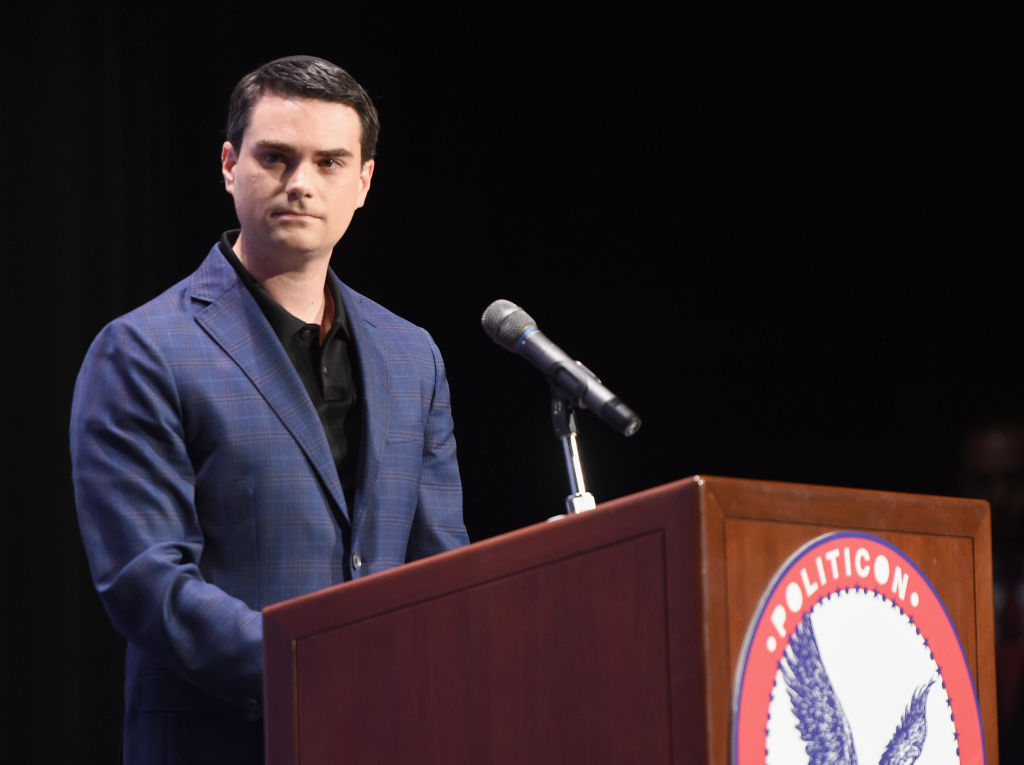In Berkeley speech, conservative Ben Shapiro taunts antifa, which didn't show up to protest him


A free daily email with the biggest news stories of the day – and the best features from TheWeek.com
You are now subscribed
Your newsletter sign-up was successful
Police at the University of California, Berkeley spent an estimated $600,000, brought in law enforcement from all nine Bay Area counties, and shut down a whole section of campus on Thursday so former Breitbart News editor Ben Shapiro could speak at Zellerbach Hall. The protests were largely peaceful, with four to nine people arrested. "For the most part it was an orderly event, attended by respectful orderly people," UC Berkeley Police Chief Margo Bennett said. "The crowd in the street was loud, but not violent." UC spokesman Dan Mogulof said at Berkeley. "There was a general sense of relief that it was peaceful."
In February, a group of black-clad anarchists joined a peaceful protest against an ultimately canceled speech by Breitbart editor and alt-right provocateur Milo Yiannopoulos, smashing windows and causing damage. UC police viewed the Shapiro speech as a test before an unconfirmed "free speech" week of talks in two weeks by Yiannopoulos, Ann Coulter, and Stephen Bannon. Like Shapiro, they were invited to Berkeley by the campus Republicans.
The "antifa" anti-fascist brigade did not show up on Thursday, but Shapiro addressed them anyway from inside Zellerbach Hall, where there was a respectful exchange of differing views between Shapiro and the under-capacity crowd. "America is watching because you guys are so stupid," he said of the antifa protesters. "You can all go to hell you pathetic, lying, stupid jackasses."
The Week
Escape your echo chamber. Get the facts behind the news, plus analysis from multiple perspectives.

Sign up for The Week's Free Newsletters
From our morning news briefing to a weekly Good News Newsletter, get the best of The Week delivered directly to your inbox.
From our morning news briefing to a weekly Good News Newsletter, get the best of The Week delivered directly to your inbox.
A free daily email with the biggest news stories of the day – and the best features from TheWeek.com
Peter has worked as a news and culture writer and editor at The Week since the site's launch in 2008. He covers politics, world affairs, religion and cultural currents. His journalism career began as a copy editor at a financial newswire and has included editorial positions at The New York Times Magazine, Facts on File, and Oregon State University.
-
 How to Get to Heaven from Belfast: a ‘highly entertaining ride’
How to Get to Heaven from Belfast: a ‘highly entertaining ride’The Week Recommends Mystery-comedy from the creator of Derry Girls should be ‘your new binge-watch’
-
 The 8 best TV shows of the 1960s
The 8 best TV shows of the 1960sThe standout shows of this decade take viewers from outer space to the Wild West
-
 Microdramas are booming
Microdramas are boomingUnder the radar Scroll to watch a whole movie
-
 Nobody seems surprised Wagner's Prigozhin died under suspicious circumstances
Nobody seems surprised Wagner's Prigozhin died under suspicious circumstancesSpeed Read
-
 Western mountain climbers allegedly left Pakistani porter to die on K2
Western mountain climbers allegedly left Pakistani porter to die on K2Speed Read
-
 'Circular saw blades' divide controversial Rio Grande buoys installed by Texas governor
'Circular saw blades' divide controversial Rio Grande buoys installed by Texas governorSpeed Read
-
 Los Angeles city workers stage 1-day walkout over labor conditions
Los Angeles city workers stage 1-day walkout over labor conditionsSpeed Read
-
 Mega Millions jackpot climbs to an estimated $1.55 billion
Mega Millions jackpot climbs to an estimated $1.55 billionSpeed Read
-
 Bangladesh dealing with worst dengue fever outbreak on record
Bangladesh dealing with worst dengue fever outbreak on recordSpeed Read
-
 Glacial outburst flooding in Juneau destroys homes
Glacial outburst flooding in Juneau destroys homesSpeed Read
-
 Scotland seeking 'monster hunters' to search for fabled Loch Ness creature
Scotland seeking 'monster hunters' to search for fabled Loch Ness creatureSpeed Read
